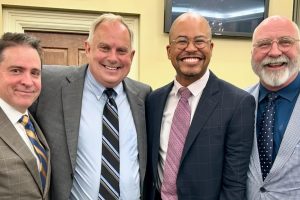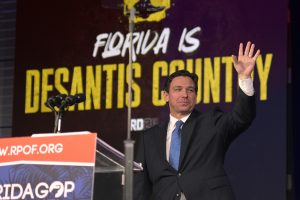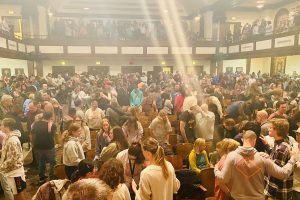By Jason Coker
One of the most endearing and memorable skit on Sesame Street is Grover’s epic near/far demonstration. I’ve never been able to forget it since I was a child, and the skit actually is just a little bit older than me — it first aired in 1975.
For the younger among us, the forever young Grover “shows” his viewers what near and far mean. He stands at attention very close to the TV screen and declares, “Near!” Then, he runs away from the screen, getting smaller and smaller, until he stops and says, “Far!” In order to help the viewers, children and adults alike, he repeats this near/far demonstration over and over again until he is out of breath from running back and forth — near to far and back again.
By the end of the two and a half minute skit, and to the delight and hilarity of his audience, Grover collapses in exhaustion trying to demonstrate the meaning of near and far. Although Grover never believes that we understood what he was trying to demonstrate, in actuality, we all got it!
Even the smallest child understood, maybe not in these exact words, that there was a major distance between the spatial concepts of near and far. Near is something close. Far is something distant. What may not have been so explicit in Grover’s skit is that there was a massive difference between near and far. In pure spatial terms, this is simply descriptive and carries no political or theological weight. I live far from my hometown. That is a spatial fact — Connecticut is a long way from Mississippi.
ear and far, then, create a binary of opposites, which is indicative of so much of our language and cultural construction of reality — we are “far” from Sesame Street at this point! Western languages are built on binaries such as near/far, white/black, male/female, right/wrong, etc. We define a word either by saying what it is not — by its opposite — or by deferring to other words. This system of binary opposites constructs reality in profound ways. It shapes the way we think about the world and about each other.
Theo-politics of near/far
When spatial concepts are used metaphorically, the near/far binary immediately raises ethical questions. What are those things that bring us close, i.e., near, as a community, and what are those things that separate us, i.e., far? These are questions of identity and otherness, and when defining community from the standpoint of faith, we need to consider the “ethics of the other.”
Identity is a boundary constructing endeavor, but it does not have to be completely exclusive. The problem is with binary language. To identify or define oneself or one’s community usually results in a negative demarcation with another. “I am not that” or “We are not them.” This is quintessential binary thinking, and it is not a modern phenomena. This is implicitly the problem in the Letter to the Ephesians. In this letter, there is an attempt to find a common ground between two groups of people who were historically at odds with one another: Jews and Gentiles. Gentiles were considered “far” from God and God’s covenant. Likewise, Jews were considered “near” to God and God’s covenant. In fact, Jews were God’s chosen people.
The problem in Ephesians, and the primary difficultly addressed by several New Testament writers, was what to do with Gentiles? The Gospel of Matthew, the Acts of the Apostles, 1 and 2 Corinthians, Galatians, and Ephesians all specifically address this issue, and other New Testament writers deal generally with internal unity and group cohesiveness (see the Gospel of John and the Epistles of John).
The earliest challenge to the Jesus movement that later became known as Christianity was the issue with Gentiles. This was both a theological and political issue due to the time in which the Jesus movement was growing and being shaped. It was theological because there was already a path for Gentiles to become Jewish — circumcision was a primary ritual for inclusion into Judaism for Gentile men. This was also a political act after the destruction of the Temple by Rome because a convert physically demonstrated allegiance to a territory in revolt against Rome. Circumcision could not be hidden in the public area of the gymnasium, so circumcision was a public act, and it was the primary ritual for Gentiles to become Jewish — and of course, the early Jesus movement was a Jewish movement.
It was the more radical factions of the early Jesus movement that reinterpreted the inclusion of the Gentiles. Paul, one of the most vocal of these advocates, clearly argued that Gentiles did not need to be circumcised (cf. Galatians 3). The Gospel of Matthew mediates this argument by reluctantly accepting Gentiles into the covenant with God by their faith. The story of the healing of the centurion’s servant (Matthew 8:5-13) and the Canaanite woman’s daughter (Matthew 15:21-28) are the best examples of the inclusion of the Gentiles in the Gospel of Matthew. Luke’s narrative of Peter and Cornelius codifies his theo-political stand on how Gentiles belong in the covenant, i.e., “What God has made clean, you must not call profane” (Acts 10:15).
All of these biblical authors are trying to mediate a major issue among their constituents: How do we include the Gentiles? The bigger question, however, was not the inclusion of the Gentiles, but the identity of the movement! Who are we?
Ephesians 2:11-22 gives a great assessment of how to think about the theo-politics of near/far in relation to the Gentile problem, and it is worth quoting at length.
“So then, remember that at one time you Gentiles by birth, called “the uncircumcision” by those who are called “the circumcision” — a physical circumcision made in the flesh by human hands — remember that you were at that time without Christ, being aliens from the commonwealth of Israel, and strangers to the covenants of promise, having no hope and without God in this world. But now in Christ Jesus you who once were far off have been brought near by the blood of Christ. For he is our peace; in his flesh he has made both groups into one and has broken down the dividing wall, that is, the hostility between us. He has abolished the law with its commandments and ordinances, that he might create in himself one new humanity in place of the two, thus making peace, and might reconcile both groups to God in one body through the cross, thus putting to death that hostility through it. So he came and proclaimed peace to you who were far off and peace to those who were near; for through him both of us have access in one Spirit to the Father. So then you are no longer strangers and aliens, but you are citizens with the saints and also members of the household of God, built upon the foundation of the apostles and prophets, with Christ Jesus himself as the cornerstone. In him the whole structure is joined together and grows into a holy temple in the Lord; in whom you also are built together spiritually into a dwelling place for God” (NRSV).
From the very beginning, it is obvious that this passage is dealing with the historic difference between Jews and Gentiles. It is also clear that the goal of this passage is to create a sense of belonging for the Gentiles by incorporating them into the covenant of God through Jesus Christ.
The theo-politics of near/far play an essential role in the way this process happens. The “far off” Gentiles have been metaphorically brought “near” by Jesus Christ. Space is created for both Jews and Gentiles to coexist in a new community. This is a movement away from the “Gentile problem” and a move toward group identity. The identity markers of Jew and Gentile are not abolished, but this new space offers a new identity for both — not a competing identity.
This “one new humanity” problematizes the binary thinking of Jew/Gentile. It disrupts the logic of this binary and offers another way to think about identity, and it does so to create community cohesion where there was division.
Theo-politics of near/far in contemporary culture
All of these biblical examples show us how our Christian ancestors negotiated the theo-politics of near/far in relation to the major moral issue of their time. The Gentile problem was the issue, but it pushed early Christianity to make very difficult decisions related to identity. What kind of community would it be? Would it allow Gentiles into the community or not? If it did, what ritual would Gentiles have to perform to enter into the community?
These were very difficult questions, but the biblical authors did their very best to work with these answers in their writings, and these writings — our sacred Scriptures — are what we use to navigate the waters of our own modern moral issues. For the writer of Ephesians, it is clear that the “one new humanity” was much more important than how to incorporate Gentiles. The “one new humanity” was the overarching identity in which all these early believers, both Jews and Gentiles, were included. This did not abolish their identities as Jews or Gentiles, it just provided a common ground for them to worship and work together for God’s common good.
The issue of homosexuality is one of our modern moral issues and so many are drawing a line in the sand — this is an identity marker more than a theo-political statement. These lines segment and divide our Christian brothers and sisters and churches in ways that prevent us all from working together for other important issues that demand attention and cooperation. The only thing that everyone agrees upon regarding homosexuality is that it is a divisive issue — one of the most divisive in our country. Denominations are being torn to pieces over how to respond to the issue. The judicial systems in our state and federal governments are feverishly working through all sorts of issues related to marriage equality, gay rights, traditional family values, etc.
I do not deny the severity of this issue for our time. Those in the LGBTQ community feel ostracized and oppressed. Those who do not agree with homosexuality feel like they are being choked by the left-wing agenda. Both sides feel victimized; both sides feel like no one is listening to them. All the while we demonize each other as sexual perverts or homophobic bigots, and as we do, we fall prey to the legacy of binary thinking, which has consumed political discourse in American politics.
What does the “one new humanity” look like in our contemporary society? This is a question of identity. Do we value cooperation and fellowship more than being right? If someone disagrees with us on this issue, does that mean we can never work together on anything else? If we disagree on the most divisive issue in American society, does that mean we cannot cooperate on anything else?
I believe that the Bible offers us examples of early Christian believers who had strong convictions about cooperation and fellowship, and those convictions guided their capacity for everything else. They genuinely believed that God’s Kingdom was a big house. I strongly believe that these biblical examples can guide us through our modern moral issues together and in cooperation, which means we won’t always agree with each other on the issues. We can, however, agree on how we work through our disagreements so that we can cooperate in other areas where we share strong conviction.
If we are constantly policing the line between near and far, we will only run out of energy just like Grover did way back in 1975.








































































